We cannot negotiate with Nature, said Jose Manuel Barroso
Adelina Marini, November 19, 2009
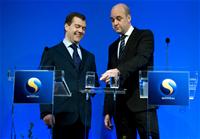 In a surprisingly cheerful atmosphere the press conference after the EU-Russia summit took place in Stockholm. A reason for the many smiles and good humour were the numerous agreements which give hope that maybe the moment, when the EU and Russia would really turn into partners and would starts listening to each other, is coming. A proof for this hope was the surprising decision of Moscow to increase its emissions reduction target by 2020 instead of 10-15%, as previously announced, with 25%.
In a surprisingly cheerful atmosphere the press conference after the EU-Russia summit took place in Stockholm. A reason for the many smiles and good humour were the numerous agreements which give hope that maybe the moment, when the EU and Russia would really turn into partners and would starts listening to each other, is coming. A proof for this hope was the surprising decision of Moscow to increase its emissions reduction target by 2020 instead of 10-15%, as previously announced, with 25%.
This definitely impressed the European leaders for whom climate change and a solid agreement in Copenhagen in December are a key priority. Therefore, it was not an accident that the Swedish prime minister Fredrik Reinfeldt and the Commission president Jose Manuel Barroso started their statements with this topic. According to Reinfeldt whose country presides the European Council by the end of December, Russia is very important for a deal in Copenhagen because it is one of the biggest CO2 emitters in the world.
The president of the Commission, on his part, explicitly underlined that he wanted to start the 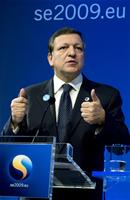 press conference with climate change and added: "Politicians try to negotiate - it is good to negotiate but we cannot negotiate with Nature, we cannot negotiate with physics, we cannot negotiate with science. And that is why it is so important the EU and Russia remain committed to this target 2 degrees Celsius maximum of temperature rise and that we take in Copenhagen a decision, based on science. And today we made a very important progress in our talks with Russia".
press conference with climate change and added: "Politicians try to negotiate - it is good to negotiate but we cannot negotiate with Nature, we cannot negotiate with physics, we cannot negotiate with science. And that is why it is so important the EU and Russia remain committed to this target 2 degrees Celsius maximum of temperature rise and that we take in Copenhagen a decision, based on science. And today we made a very important progress in our talks with Russia".
The Russian president Dmitry Medvedev started his statement with the main problem for Russia - the vise regime with EU. Regarding the conference in the Danish capital, however, he gave an answer that probably had predisposed his European partners very much: "We have the some concerns about climate change and we would like to continue our cooperation here actively. Russia has always been in the mainstream of the European understanding on what must be done to solve this issue. Now we have a goal to convince our colleagues from other states that we are serious on the matter. All this should be done before we go in Copenhagen which I hope will be a success. Although we have agreed that there won't be a legally binding agreement but agreed that we should go ahead".
However, the conditional in the Russian position put a darker tinge in the otherwise good atmosphere. Russia will stick to this commitment only if the other countries take similar measures.
In the meantime, in the statement of Mr. Reinfeldt there was an admission that the conference in the Danish capital will not be that successful as Brussels had hoped. "We want to see an agreement in Copenhagen, an agreement that after that can be put in a legal framework after Copenhagen as has been discussed in Singapore. And we also agree that we should stick to the 2 degree target, that would mean that we need reductions both from developed and developing part of the world", Reinfeldt said, presenting by this the new, slightly changed European position.
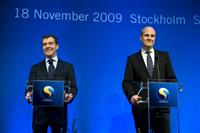 And although the European partners did not respond directly on the issue of visa waving for Russian citizens, the president of the Commission announced that the EU and Russia had discussed on their summit a new agreement for modernisation of Russia. No concrete parametres were mentioned like money or projects but, according to Barroso, this was something that would help citizens of Russia and the EU trade to be facilitated and intensified. For the purpose both sides should work on regulation convergence, exchange of students, scholars and technology. To achieve this, Mr. Barroso implied that Russia will need to change many fundamental things - rule of law, "lively and pluralistic civil societies because this is the basis for every modern systems".
And although the European partners did not respond directly on the issue of visa waving for Russian citizens, the president of the Commission announced that the EU and Russia had discussed on their summit a new agreement for modernisation of Russia. No concrete parametres were mentioned like money or projects but, according to Barroso, this was something that would help citizens of Russia and the EU trade to be facilitated and intensified. For the purpose both sides should work on regulation convergence, exchange of students, scholars and technology. To achieve this, Mr. Barroso implied that Russia will need to change many fundamental things - rule of law, "lively and pluralistic civil societies because this is the basis for every modern systems".
In response the Russian president added that 50-60% of its trade is with Europe and underlined that Russian citizens should be able to visit the EU for shorter periods without visas as the European can do that in Russia. He admitted that Russia has a lot of red tape which impedes trade relations between the two sides. But, in spite of the obvious rapprochement of the positions of EU and Russia on many topics, Dmitry Medvedev recalled: "The EU is not a state, on the opposite - the EU is a Union of states which have certain sovereignty but it does not suppress the rights of the states in ti, so we will intensify our relations both with the EU and with member states".
Given the elections today in Brussels of a new high representative of the EU, called popularly a foreign minister, according to the Lisbon Treaty which comes into force on the 1st of December, the current High Representative Javier Solana made a short farewell statement, saying good-bye to Russia. He recalled that he had attended 20 EU-Russia summits. Yesterday it was the 24-th.
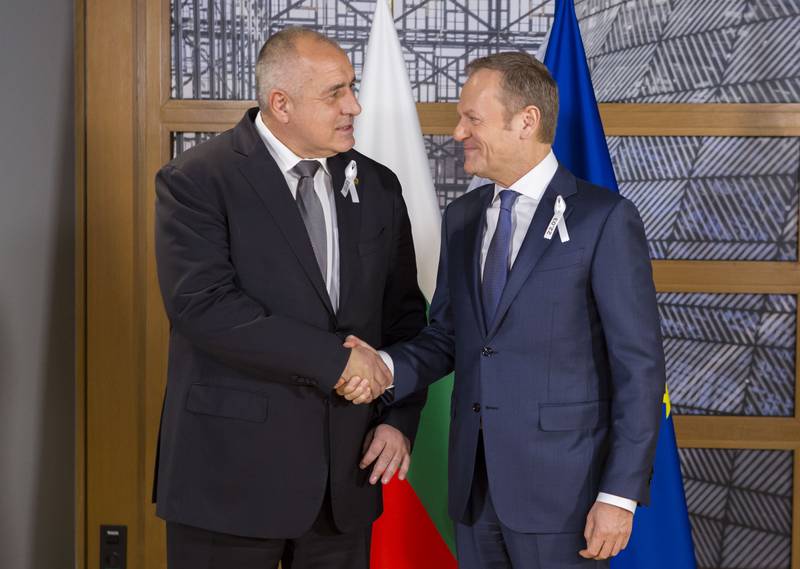 Boyko Borissov, Donald Tusk | © Council of the EU
Boyko Borissov, Donald Tusk | © Council of the EU Boris Johnson | © Council of the EU
Boris Johnson | © Council of the EU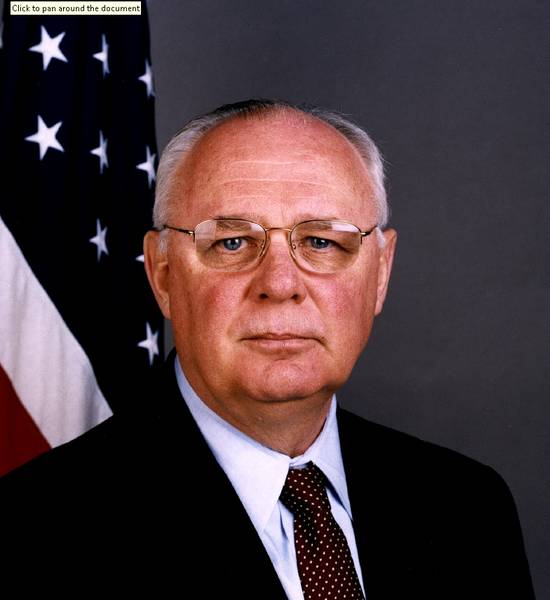 James W. Pardew | ©
James W. Pardew | ©